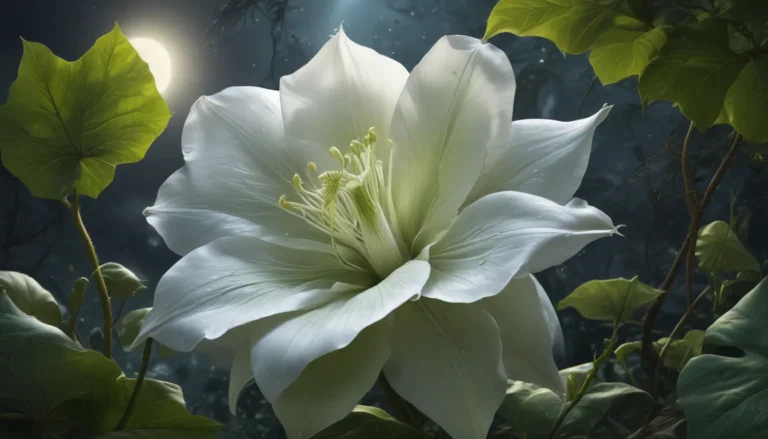The pictures we use in our articles might not show exactly what the words say. We choose these pictures to make you interested in reading more. The pictures work together with the words but don’t take their place. The words still tell you the important facts.
Welcome to the captivating world of the lotus flower, a mesmerizing aquatic plant that transcends mere physical beauty to embody profound cultural, spiritual, and symbolic significance. From its ability to flourish in adverse conditions to its revered status in ancient mythologies, the lotus flower has captivated hearts and minds for centuries. Join us on a journey as we explore 20 fascinating facts about this extraordinary plant, unraveling the mystique that surrounds it and delving into its botanical characteristics, cultural symbolism, and historical significance.
The Symbolism of Spiritual Enlightenment
The lotus flower is often synonymous with purity, spiritual awakening, and enlightenment, making it a powerful symbol in Buddhism and Hinduism. Its transformative journey from murky waters to a radiant bloom represents spiritual growth and transformation, inspiring individuals to rise above adversity and embrace the light within.
Diverse Meanings Across Cultures
Beyond its spiritual significance, the lotus flower holds diverse meanings across various cultures. In ancient Egyptian mythology, it symbolizes creation and rebirth, while in Chinese and Japanese art, it represents purity and grace. This universal symbol of beauty and resilience transcends borders and speaks to the innate human desire for renewal and hope.
Resilience in Adversity
Despite its delicate appearance, the lotus flower is a symbol of resilience and strength. It thrives in diverse environments, including muddy ponds and marshes, showcasing its ability to rise above challenges while remaining unscathed. Like the lotus, we too can overcome obstacles and emerge stronger and more beautiful than before.
Medicinal Properties and Nutritional Benefits
For centuries, the lotus flower has been revered for its medicinal properties. Its petals, seeds, and rhizomes are believed to possess therapeutic qualities, aiding in the treatment of various ailments such as inflammation and gastrointestinal issues. Additionally, the lotus flower is edible, with its seeds, roots, and young leaves prized for their nutritional benefits and unique flavors.
A Colorful Array of Varieties
Lotus flowers come in a kaleidoscope of colors, each carrying its own symbolism and significance. The pink lotus symbolizes devotion and purity, while the white lotus represents spiritual perfection and mental purity. Whether vibrant pink, serene white, or sunny yellow, each hue tells a story of grace, beauty, and inner transformation.
Cultural Reverence in India
In India, the lotus flower holds deep cultural and religious significance. It is associated with deities such as Lakshmi, the goddess of wealth and prosperity, and Brahma, the creator of the universe, symbolizing beauty, fertility, and eternity. The lotus's presence in Indian art, architecture, and literature reflects its timeless allure and sacred symbolism.
Inspiration in Art and Architecture
The lotus flower's elegant form and symbolic connotations have inspired artists and architects throughout history. From ancient temples to modern sculptures, the lotus motif adorns artworks worldwide, serving as a source of inspiration and creativity. Its timeless beauty transcends cultural boundaries, resonating with admirers and creators alike.
Integral Role in Yoga and Meditation
The lotus position, or Padmasana, is a fundamental yoga pose that symbolizes balance, harmony, and inner peace. Resembling the bloom of a lotus flower, this posture is often adopted during meditation to promote focus, mindfulness, and spiritual alignment. By emulating the lotus's grace and resilience, practitioners can enhance their physical, mental, and emotional well-being.
Symbol of Rebirth and Resurrection
The lotus flower's ability to rise from the depths of murky waters and bloom anew each day symbolizes rebirth and resurrection. It serves as a powerful reminder of the human spirit's triumph over adversity and the promise of new beginnings. Just as the lotus emerges unblemished from muddy waters, we too can overcome challenges and embrace the light of transformation and renewal.
Inspiring Poets and Writers
The lotus flower's ethereal beauty and metaphorical depth have inspired poets and writers across the ages. Its exquisite form and symbolic significance evoke themes of purity, transcendence, and spiritual awakening in literature and poetry. Through eloquent verses and timeless prose, writers capture the essence of the lotus's symbolism, inviting readers to contemplate life's mysteries and possibilities.
Popular Tattoo Design
The lotus flower is a sought-after motif in the realm of body art, chosen for its aesthetic appeal and profound symbolism. Representing personal growth, resilience, and spiritual evolution, the lotus tattoo symbolizes an individual's journey toward enlightenment and self-discovery. Each tattoo tells a unique story of transformation, strength, and inner beauty, reflecting the enduring allure of the lotus flower.
Nutritional Value of Lotus Seeds
Lotus seeds, also known as lotus nuts, are harvested from the flower and prized for their nutritional properties. Rich in protein and minerals, these seeds are a staple ingredient in Asian cuisine, known for their health benefits and distinctive flavor. Whether roasted as a snack or incorporated into savory dishes, lotus seeds symbolize nourishment, vitality, and natural abundance.
Revered in Festivals and Ceremonies
Across many Asian countries, the lotus flower is honored through vibrant festivals and ceremonial rituals. These events celebrate the flower's cultural significance and spiritual symbolism, paying homage to its enduring influence on traditional practices and beliefs. From dance performances to religious ceremonies, the lotus takes center stage as a symbol of beauty, purity, and divine grace.
Association with Goddesses and Deities
In various mythologies, goddesses and deities are often depicted holding or seated upon lotus flowers, symbolizing their divine attributes and auspicious presence. This association underscores the lotus's sacred symbolism and spiritual significance, highlighting its role as a symbol of divinity, grace, and eternal beauty.
Feng Shui and Positive Energy
In Feng Shui, the lotus flower is revered for its harmonizing properties and ability to attract positive energy and good fortune. By incorporating lotus motifs into homes and spaces, individuals seek to promote tranquility, balance, and prosperity. The lotus's presence in Feng Shui practices reflects its universal appeal as a symbol of purity, enlightenment, and abundance.
Emblem of Beauty and Elegance
Renowned for its exquisite form and graceful demeanor, the lotus flower is celebrated as a symbol of beauty and elegance. Its captivating appearance has inspired artists, poets, and admirers throughout history, symbolizing grace, refinement, and inner radiance. Like the lotus, we too can embody beauty, resilience, and serenity in the face of life's challenges.
Subject of Scientific Interest
Beyond its cultural and symbolic significance, the lotus flower has piqued the interest of scientists and researchers due to its unique biological properties. Studies have explored its self-cleaning abilities and hydrophobic surfaces, offering insights for various applications in engineering, materials science, and environmental sustainability. The lotus's natural adaptations inspire innovation and creativity, bridging the gap between nature and technology.
Philosophical Reflections on the Lotus Flower
The lotus flower's journey from darkness to light, from adversity to triumph, is often interpreted as a metaphor for life's challenges and spiritual evolution. Its enduring symbolism prompts philosophical contemplation and introspection, inviting individuals to reflect on their own journeys of growth, transformation, and self-realization. The lotus's profound teachings resonate with seekers and thinkers, offering wisdom and guidance in navigating life's complexities and uncertainties.
Timeless Symbol of Renewal and Hope
With its enduring symbolism of renewal, purity, and hope, the lotus flower continues to inspire and resonate across cultures and traditions. As a timeless emblem of resilience and spiritual growth, the lotus symbolizes the potential for transformation, healing, and enlightenment. Its radiant beauty and symbolic depth speak to the universal yearning for renewal and rebirth, reminding us of the infinite possibilities that lie within each of us.
In conclusion, the lotus flower's profound symbolism, cultural significance, and natural beauty make it a revered and cherished emblem in various traditions, art forms, and spiritual practices. Its enduring allure and metaphorical depth continue to captivate and inspire individuals around the world, reaffirming its status as a symbol of spiritual enlightenment and renewal. By embracing the lotus's teachings of growth, transformation, and unwavering grace, we can find strength, inspiration, and solace in our own journeys of self-discovery and spiritual evolution.
Unveiling the Hidden Gems of the Lotus Flower
As we immerse ourselves in the enchanting world of the lotus flower, we uncover hidden gems of architectural wonder, cultural celebration, and spiritual contemplation. Explore the serenity and spirituality of the Lotus Temple, where beauty and grace converge in a harmonious blend of nature and architecture. Join the vibrant festivities of the Lotus Lantern Festival, a testament to cultural heritage and unity, where the lotus shines as a beacon of hope and renewal. Embark on this journey of discovery and enlightenment as we unveil the rich tapestry of stories, traditions, and inspirations that surround this iconic flower.
Your Feedback Matters!
Our commitment to delivering trustworthy and engaging content is at the heart of what we do. Each fact on our site is contributed by real users like you, bringing a wealth of diverse insights and information. Our dedicated editors meticulously review each submission to ensure the highest standards of accuracy and reliability. Trust in our commitment to quality and authenticity as you explore and learn with us. If you found this article helpful and enlightening, we would love to hear your thoughts and feedback. Your input shapes the content we create and ensures that we continue to provide valuable and engaging information for our readers. Thank you for joining us on this journey of discovery and learning.






